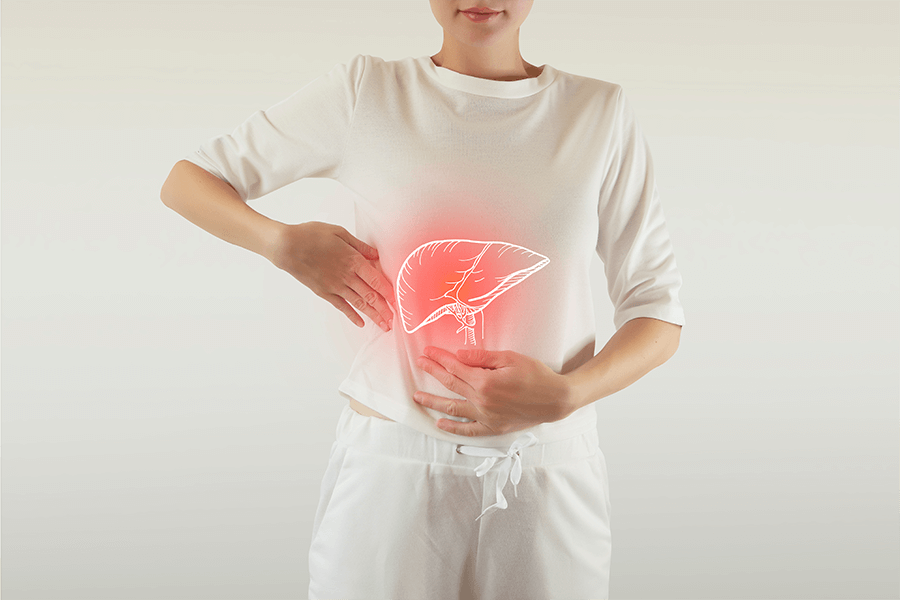What is FibroScan?
FibroScan is a test put to use by the gastrointestinal specialists at Colorado Gastroenterology to noninvasively analyze the liver. Also referred to as transient elastography, the scan uses a specific ultrasound technology to evaluate the occurrence of fibrosis and steatosis in the liver. Fibrosis occurs when the liver exchanges healthy tissue with cicatrix (scar) tissue in an attempt to remedy itself from an underlying condition. Hepatic steatosis is also known as fatty liver disease and appears when fat accumulates inside the liver cells.
Using FibroScan, your Denver, CO gastrointestinal specialists may assess the state and working condition of your liver, and make a diagnosis and medical plan without invasively entering the body to review the liver. If you suffer with a liver issue, contact Colorado Gastroenterology to learn if you could find value from FibroScan technology.

Who is a candidate for FibroScan?
FibroScan analysis might be favored for clients who have early to advanced liver disease or other conditions. These might encompass:
- Hemochromatosis
- Different classes of chronic liver disease (CLD)
- Alcoholic FLD
- Nonalcoholic steatohepatitis (NASH)
- Insulin resistance syndrome (syndrome X)
- Cirrhosis of the liver (harsh scarring)
- Primary biliary cholangitis (PBC)
- Specific types of hepatitis
How is FibroScan conducted?
A FibroScan examination in Denver, CO is all-in-all a comfortable option that is accomplished within 10 – 15 minutes. A detector will be placed on your skin right next to your liver. This special detector sends sound waves via your liver to measure the speed at which point sound travels through the organ. The FibroScan technology then develops a series of findings that your Colorado Gastroenterology GI physician will interpret to analyze the degree of stiffness (fibrosis) represented in your liver.
How do you understand and translate FibroScan results?
FibroScan findings are given according to fatty liver disease (steatosis) grade of severity and fibrosis score. The subsequent charts consist of general information regarding what the results of the examination could show. You may discuss your results in detail with your Colorado Gastroenterology provider after your FibroScan procedure.
Steatosis grade: The steatosis findings explain the level of fatty change in the liver and is delivered via a controlled attenuation parameter (CAP) score, which is evaluated in dB/m (decibels per meter). The scope is from 100 to 400 decibels per meter, and different ranges cause a different fatty liver grade.
|
CAP Score (dB/m) |
Steatosis Grade |
Amount of Liver With Fatty Change |
|
238 – 260 |
S1 |
11% – 33% |
|
260 – 290 |
S2 |
34% – 66% |
|
290 + |
S3 |
67% + |
Fibrosis score: The fibrosis end result is an estimation of the scarring of the liver and illustrates the level of scarring that the liver has experienced. Your gastrointestinal specialists will utilize your FibroScan findings integrated with your medical records to ascertain your fibrosis value. Various liver diseases and conditions can change the fibrosis score.
- F0 to F1: No scarring/mild scarring
- F2: medium scarring
- F3: Severe scarring
- F4: extremely progressive scarring (cirrhosis)
What are the benefits of FibroScan?
Because FibroScan utilizes ultrasound technology, there is small to no problem linked with the procedure. FibroScan is a non-invasive imaging procedure and for that reason is more often than not comfortable. It enables an extensive exploration of the whole liver rather than just the tiny part that takes place in a liver biopsy. Also, no sedation is required for the therapy, it is relatively economical, briskly accomplished, and the outcomes are instant.

Expert treatment for liver conditions
FibroScan® FAQs
How do I prepare for my FibroScan test?
We ask that you do not eat or drink anything except small sips of water and your daily medications three hours before your FibroScan test. Our doctors encourage you to wear loose and comfortable clothes so it’s uncomplicated for your provider to access the right side of your ribcage. Your GI doctor will review these instructions with you ahead of your procedure so you understand what to expect from your FibroScan test.
What liver concerns can FibroScan assess?
A FibroScan test can diagnose and record the progression of several liver conditions, including:
- NAFLD (nonalcoholic fatty liver disease)
- Alcoholic liver disease
- NASH (non-alcoholic steatohepatitis)
- Hepatitis B and C
- Hemochromatosis
Is there a difference between FibroScan and an ultrasound?
FibroScan is a form of ultrasound that uses the same technology a standard ultrasound uses — transient elastography. However, even though they are alike, FibroScan was specifically developed to measure how stiff the liver is and is more sensitive to detecting liver issues than a standard ultrasound.
Is FibroScan better than a liver biopsy?
FibroScan is a nonsurgical alternative to the liver biopsy. There may be certain instances in which a liver biopsy may be the better choice, however. This could be suggest for a person who has a defibrillator or pacemaker, who is pregnant, or who has fluid in their abdomen. It’s also been discovered that results could become incorrect in people who are morbidly obese. Keeping all of this in mind, our Colorado Gastroenterology GI doctors will closely work alongside you to decide if the FibroScan test or a liver biopsy is better for your needs.
